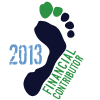One of the precepts that I've always followed when it comes to "what works," whether it be running, exercise in general, diet, whatever, is to try to have something measurable against which I can judge my progress. I didn't start out using a heart rate monitor, for instance; I judged my progress strictly by how far or how long I could run, and figured that as my mileage or time increased, I was getting better. And there was a certain amount of truth to that.
I put on my first HRM about 17 years ago, and I have to tell you I was shocked by what I found. Forget the ultra-slow MAF pace; just using the old 180-age calculation, or other, more accurate ways of calculating heart-rate max, I found that I was just working too hard, too often. So, I decided that I would follow a program of slower paced runs, the pace determined by staying within a given hr aerobic range. Well, I improved my endurance and speed within weeks. Of course, I was running shod then, so I also got injured more frequently. Go figure.
My feeling is that the majority of runners (or people just working out to get fit) have little to no idea if what they are doing is actually going to help them achieve whatever goals they've set. I see folks at the gym all the time, working out on the stationary or recumbent bikes or the treadmill, and I know that what they're doing is either way too hard (and hence, way too short in duration), or more often, way too slow, and so, unlikely to show substantial improvements, increasing the likelihood that they'll give up before the magic happens. That's really sad, because I know from experience that if they were to use a gauge like a hr monitor, they might realize that they don't have to work quite as hard, or, maybe just a little bit harder, but they'd see positive effects from their efforts and thus be more inclined to stick with it. And I agree that perceived-rate-of-exertion is likely just as good a determinant as heart rate monitoring, but again, I try to look at things from the perspective of someone just getting started with an exercise program and ask myself: what is the simplest way to give them good biofeedback so that they'll see improvements more quickly, thereby increasing the likelihood that exercise will become a lifelong habit. I have a real passion for this, because, on a societal level, we just can't sustain the trajectory of lifestyle-born illness, and think it's important to get people into the door and keep them in the room, where they are then free to debate the merits of this method or that, because all the while THEY'RE STILL MOVING!
MAF training intrigues me as a measuring method, and to see if even more extreme slowing would actually achieve the results claimed, so I'm willing to give it a few months of my running life, particularly here at the beginning barefoot stages. My opinion of the entire Maffetone method isn't quite as charitable, as I happen to think that his dietary advice isn't very good, so I leave that part alone. Since I'm not 20 with visions of blistering speed in my head, I can be a little more sanguine about that aspect of my running.
Sorry for such a long-winded response, but it's great to be able to discuss these sorts of things with people who are as passionate and committed to this way of life. I train on my own, so don't really get to have these sorts of discussions except in my own head. Thanks for giving me a spark to carry me through the day, Lee!
 I have to do a LOT of run-walk-run, and when I download my Garmin my heart rate graph looks very much like a saw blade instead of any kind of wave form.
I have to do a LOT of run-walk-run, and when I download my Garmin my heart rate graph looks very much like a saw blade instead of any kind of wave form. 






























